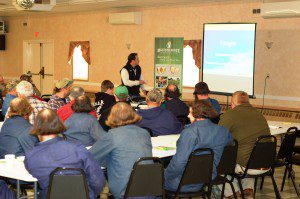
Lancaster County, Pa-based King’s AgriSeeds, Inc., a leader in the movement for a high-forage livestock diet, advocates a diverse crop rotation and teaches farmers to find the right place in their rotation for its line of forage seed. Over the past two months, King’s staff members met with local farmers in locations across Pennsylvania, New York State, Maryland and Virginia as part of a string of Winter Forage Meetings to educate customers and dealers. During the course of these all-day interactive presentations, owner Tim Fritz and other staff members introduced the company’s line of forage and pasture seed and discussed the agronomics and management techniques used by livestock producers, as well as various cover crop applications.
King’s staff, featuring four agronomists of diverse backgrounds and a dairy nutritionist, with the addition of academic guest speakers like Penn State Professor of Agronomy and Weed Science Dr. Bill Curran, spoke about maximizing land productivity in pastures, hayfields, and cornfields; and herd productivity with a high-forage diet that minimizes purchased grain.
Mr. Fritz emphasized that high quality forage starts with good genetics. Grain cannot make up for low quality forage; a high quality crop comes from a combination of superior seed and excellent management. Already confident in the quality of their products, King’s representatives spent the meeting time on what Mr. Fritz calls “educational marketing” to teach customers and dealers to maximize the value of the crop with a sound rotation, weed management, soil health maintenance, and selection of forage genetics to meet the demands of their systems.
Staff deftly fielded questions with detailed, knowledgeable responses on a range of topics. Audiences repeatedly expressed the most interest in the season-appropriate topics of both forage sorghum planting and frost-seeding of clovers into thinning pastures. Others said they wanted to hear about comparisons between grazing, tillering corn and sorghum-sudangrass; quality and tonnage comparisons for all forage crops at various growth stages; rotational grazing; cover crops in a no-till system; making hay in a day; and effective management of winter annuals for high yield.
Dave Wilson, King’s Research Agronomist, brought his unique background working in both corn and small grain seed production and organic crop research to address the spectrum of questions about conventional and organic systems. Mr. Wilson and other speakers gave advice about sound agronomic management techniques that would be an important foundation in both an organic and conventional system. Crop rotation and solid genetics are pillars of productivity, he told the audience, and a longer, more complex rotation and the use of locally-adapted varieties lead to higher yields, decreased pest problems, and less need for genetically engineered traits. Mr. Wilson advocated not only varying cropping systems but also experimenting with cover crop and pasture seed mixtures containing multiple species. This adds not only a nutritional bonus when the mix is cut for forage, but additional stability and diversity in the field. Different species growing together tend to have a synergistic quality, showing a benefit that appears more than the sum of its parts.
Dr. Curran’s talk reminded the audience of the many management practices to consider for weed suppression, of which herbicide application is only a part. He reminded farmers that there is no single magic fix for weeds, but “many little hammers” – cultural, chemical, biological, and mechanical practices. He spoke about considerations like nutrients, tillage systems, critical “weed-free” windows that vary for each crop, weed growth habits, and the different abilities of each weed species to compete with the main crop. Decrease the seeds in the weed seed bank by limiting both seeds’ chance to germinate and the weed crop to produce seeds, and your need for management declines sharply after a few years. “Crop rotation is the biggest part of that, and has the biggest effect on the need for weed management,” he said. This includes rotating tillage and no-till, as well as mixing in crops with different temperature and lifecycle needs. “A healthy crop is also one of your best weed management tools.”
Owner Tim Fritz and Mid-Atlantic Regional Sales Coordinator David Hunsberger presented the KingFisher line of alfalfa seed, background on the breeding and selection process, and how to choose the most appropriate variety for individual needs. Among these – Traffic Pro, whose deep-set crown and helps it thrive under heavy hoof and wheel traffic; 444, noted for winter-hardiness; and PLH-322, a leaf-hopper resistant hybrid. Adding grass mixtures to alfalfa (such as King’s mixtures that include timothy, tall fescues, orchardgrass, and festulolium) is useful for adding highly digestible fiber, diversity, yield, and easier drydown to a hay crop. Grass helps digestibility by slowing the rate of passage, said Mr. Hunsberger, a dairy nutritionist.
Later in the afternoon, Mr. Wilson spoke about management techniques for several winter annuals, such as winter triticale and rye. Optimum forage quality is achieved at Stage 9, or flag leaf stage, he noted. At this point, the small grain crop is vegetative and the grain head has not yet emerged. After this point, yield goes up, but digestible fiber drops off quickly as the stems become more lignified.
Agronomist Tracy Neff and David Hunsberger later explained forage sorghum, sorghum-sudan, and sudangrass hybrids, a product lineup in which they could recommend a type to fit almost any situation. These summer annual products are a key crop to utilize on droughty soils – like Central PA shaley soil types – where they can be quite productive in hot, dry conditions for an economical seed cost.
It was quite clear that King’s staff is enthusiastic and knowledgeable about their work, eager to introduce producers to the value (both in cost-effectiveness and herd health) of a high-forage diet, and excited to build lasting, loyal relationships with customers, in which education comes before sales.
King’s looks forward to hosting its final meeting in Dayton, VA on February 26th. If you are interested in attending this meeting, please contact King’s AgriSeeds at 717-687-6224.
